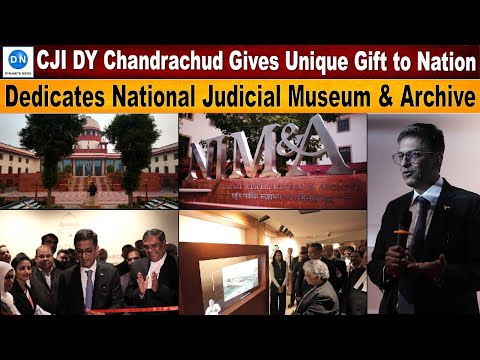VIDEO: Have a look at country's first National Judicial Museum and Archive in Supreme Court
Speaking at the inauguration of the museum, CJI Dr DY Chandrachud reflected on the importance of judicial institutions in delivering justice and protecting the fundamental rights of the citizens. Read further on Dynamite News:
New Delhi: Chief Justice of India Dr DY Chandrachud has given the nation a unique gift before his retirement. On Thursday, he dedicated a unique National Judicial Museum and Archive Center, showcasing the country's judicial history, to the people of India.
CJI inaugurates Museum & Archive Center
In the presence of Supreme Court judges and lawyers, Dr. DY Chandrachud inaugurated the museum by cutting the ribbon. This museum is unique and historic in many ways. It is the country's first museum where visitors can explore and understand the glorious journey of India’s judiciary, from ancient times to the present. This museum, which covers the judicial journey from the British era to the present, has been set up in the Supreme Court premises.
Speaking at the inauguration of the museum, CJI reflected on the importance of judicial institutions in delivering justice and protecting the fundamental rights of the citizens.
Indian Constitution
People can see the Indian Constitution in a digital format in the this three-story museum. The National Judicial Museum exhibits a detailed history of the Supreme Court, the ancient justice system, and the historical developments, as well as an interactive AI Lawyer from modern technology.
Dr. DY Chandrachud said, "This has taken almost a year and a half in conceptualization and planning. The actual execution has taken about six months. It’s been done in record time. We thought that we must have not just a museum of artifacts, but a museum comparable to the best internationally, to project the importance of our institution and the high courts in delivering justice to our citizens and in protecting the fundamental rights of our citizens."
Visitors can also see how the design and structure of judges' chairs have evolved over the period of time, including old typewriters used for typing judgments, which are now displayed in the museum and being enjoyed by the visitors.
Judicial System
A separate section on the Judicial System in Ancient India has also been created. CJI said, "On the behalf of all my colleagues here, I have pleasure in dedicating this museum to the nation to allow this museum to become an interactive space for the younger generation."
One of the most special aspects of this museum is that any common citizen can visit it. Anyone coming here will have the opportunity to view and understand the exciting journey of India's judicial system, from its ancient roots to the present day, that too all under one roof. There is also a theater where the judicial journey can be viewed. The museum reflects the importance of the court to our nation. The executors of this museum also designed the Pradhanmantri Sangrahalay at the Teen Murti Bhawan in the national capital.
To ensure that common citizens can visit the museum, a service center will be set up at the Supreme Court in the coming days, where people can get the entry through an entry pass. School groups can also visit by registering online and applying via email.
Also Read |
Here is what CJI DY Chandrachud observed against bulldozer action on Manoj Tibrewal Aakash’ petition
Visitors share their experiences
There is great enthusiasm and excitement among the youth regarding this museum. The Dynamite News team also spoke to some of the young visitors to know about their experiences.
Dynamite News spoke with people present at the museum, who said that CJI Chandrachud’s initiative not only preserves the rich history and heritage of the country's judiciary but also provides an invaluable platform for the future generations to understand the development of our legal system.
The museum also showcases the designs of various High Courts from across the country. Currently, all information is available in English, but it will soon be launched in 14 to 16 languages of the country. The museum also have a separate section highlighting the empowering role of women in the judiciary.
 Dynamite News
Dynamite News 
